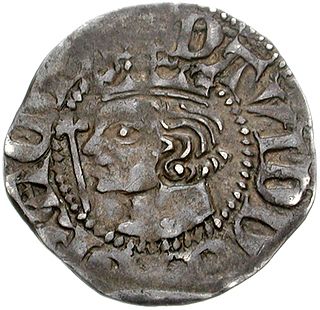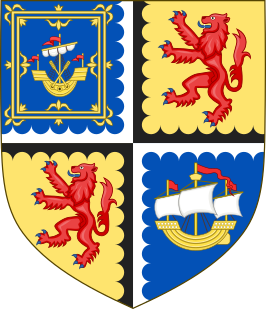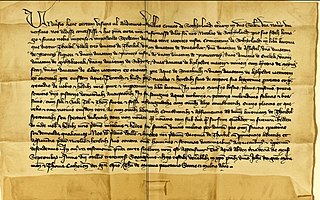Related Research Articles

David II was King of Scots from 1329 until his death in 1371. Upon the death of his father, Robert the Bruce, David succeeded to the throne at the age of five, and was crowned at Scone in November 1331, becoming the first Scottish monarch to be anointed at their coronation. During his childhood Scotland was governed by a series of guardians, and Edward III of England sought to take advantage of David's minority by supporting an invasion of Scotland by Edward Balliol, beginning the Second War of Scottish Independence. Following the English victory at the Battle of Halidon Hill in 1333, David, his queen and the rump of his government were evacuated to France, where he remained in exile until it was safe for him to return to Scotland in 1341.

Clan Mackay is an ancient and once-powerful Highland Scottish clan from the far North of the Scottish Highlands, but with roots in the old Kingdom of Moray. They supported Robert the Bruce during the Wars of Scottish Independence in the 14th century. In the centuries that followed they were anti-Jacobite. The territory of the Clan Mackay consisted of the parishes of Farr, Tongue, Durness and Eddrachillis, and was known as Strathnaver, in the north-west of the county of Sutherland. However, it was not until 1829 that Strathnaver was considered part of Sutherland when the chief sold his lands to the Earls of Sutherland and the Highland Clearances then had dire consequences for the clan. In the 17th century the Mackay chief's territory had extended to the east to include the parish of Reay in the west of the neighbouring county of Caithness. The chief of the clan is Lord Reay and the lands of Strathnaver later became known as the Reay Country.

This page is concerned with the holders of the forfeit title Earl of Douglas and the preceding feudal barons of Douglas, South Lanarkshire. The title was created in the Peerage of Scotland in 1358 for William Douglas, 1st Earl of Douglas, son of Sir Archibald Douglas, Guardian of Scotland. The Earldom was forfeited by James Douglas, 9th Earl of Douglas, in 1455.

Clan Sutherland is a Highland Scottish clan whose traditional territory is the shire of Sutherland in the far north of Scotland. The chief of the clan was also the powerful Earl of Sutherland, however in the early 16th century this title passed through marriage to a younger son of the chief of Clan Gordon. The current chief is Alistair Sutherland who holds the title Earl of Sutherland.
The Battle of Torran Dubh also known as the Battle of Torran-dow or the Battle of Torran Du was a Scottish clan battle that was fought in 1517 in Sutherland, in the Scottish Highlands.

William de Moravia was the 5th Earl of Sutherland and chief of the Clan Sutherland, a Scottish clan of the Scottish Highlands. William, 5th Earl of Sutherland was a loyal supporter of David II of Scotland in the wars against England.

Robert Sutherland, was the 6th Earl of Sutherland and chief of the Clan Sutherland, a Scottish clan of the Scottish Highlands.

John Sutherland, was the 7th Earl of Sutherland and chief of the Clan Sutherland, a Scottish clan of the Scottish Highlands.

John Sutherland, was the 8th Earl of Sutherland and chief of the Clan Sutherland, a Scottish clan of the Scottish Highlands.
Alexander Gordon, Master of Sutherland (c.1505-1530), Scottish magnate, made Earl of Sutherland in 1527.
The Murrays of Aberscross were a minor noble Scottish family who were seated at Aberscross Castle, in the county of Sutherland, Scotland. The Murrays in Sutherland are recorded specifically as a clan in two Acts of the Scottish Parliament of the 16th century.
The Sutherlands of Kilphedder (Killipheder) were a minor noble Scottish family and a branch of the ancient Clan Sutherland, a Highland Scottish clan. They were seated at Killipheder, in the county of Sutherland, Scotland.
Iye Mackay, 4th of Strathnaver was the chief of the ancient Clan Mackay, a Scottish clan of the Scottish Highlands. He was murdered along with his eldest son Donald at Dingwall Castle during a feud with the Earl of Sutherland, chief of the Clan Sutherland.
Iye Roy Mackay, 10th of Strathnaver, was the tenth chief of the ancient Clan Mackay, a Scottish clan of the Scottish Highlands.
John Mackay, 11th of Strathnaver, was the eleventh chief of the ancient Clan Mackay, a Scottish clan of the Scottish Highlands.

The Raid of Angus took place in 1391 when Alexander Stewart, Earl of Buchan, otherwise known as the Wolf of Badenoch raided the lands of Angus, Scotland.

George Sinclair was a Scottish nobleman, the 5th Earl of Caithness and chief of the Clan Sinclair, a Scottish clan based in northern Scotland.

Nicholas Sutherland, 1st of Duffus was a Scottish noble who was seated at Duffus Castle, near Elgin, Moray, Scotland in the 14th and 15th centuries.

Elizabeth Sutherland, was the 10th Countess of Sutherland having succeeded to the Earldom of Sutherland after her brother John Sutherland, 9th Earl of Sutherland died in 1514.
Alexander Gordon, 12th Earl of Sutherland was a Scottish landowner.
References
- 1 2 Fraser, Sir William (1892). The Sutherland Book. Vol. 1. Edinburgh: s.n. pp. 38-42. Retrieved 16 January 2021.
- ↑ Fraser, Sir William (1892). pp. 34 and 36.
- ↑ Mackay, Angus (1906). The Book of Mackay. 25 George IV Bridge, Edinburgh: N. Macleod. p. 46 . Retrieved 16 January 2021.
{{cite book}}: CS1 maint: location (link)